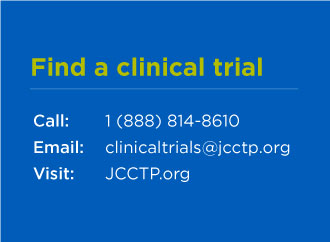Before your transplant, you may have been asked to join a clinical trial, also known as a research study. A clinical trial is a way for doctors to gather information about how well a specific treatment might work, such as a new way to prepare patients for a blood or marrow transplant (BMT).
But there are also many research studies you can join after BMT, including studies testing new treatments for BMT complications like graft-versus-host disease (GVHD). In other cases, there are clinical trials testing whether new drugs can help BMT recipients recover faster.
That was the case with Adam, who had a BMT to treat acute myeloid leukemia (AML). He decided to join a clinical trial testing a new drug. “It’s a study to see if this drug taken as a maintenance drug after BMT does anything to help patients do better,” he says.
Clinical trials can help improve outcomes (results) for patients. They can also help doctors make important discoveries that may help future patients. For Adam, both factors were important to him when he was deciding whether or not to join the research study.
“To be honest, I asked what the benefits were for me,” he says. His doctor didn’t know if it would help him. But as Adam thought more about it, he began to think less about the benefit for himself and more about how the research could be useful for others. “The benefits are for future use of the drug, and future patients,” he says. “That was my motivation.”
There can be both risks and benefits to patients joining research studies, says Scott Kerwin, MN, RN, Clinical Trial Patient Education Specialist. “Joining a clinical trial is a very personal choice,” he says.
Most of the newest treatments are only available to patients through clinical trials, according to Scott. They may be very appealing to patients who haven’t gotten better with standard treatments and have few other options, he says.
Another benefit, Scott notes, is that often a patient’s health will be more closely monitored due to the extra visits, procedures, scans and data collection as part of the clinical trial. For Adam, he was concerned about those extra appointments at first. He says, “I’m given enough pills for 1 month. I thought getting back to the clinic each month for pills would be an issue. But it hasn’t been difficult. I’m in the 11th month now.”
Some risks include receiving drugs or other therapies that are unproven or have never been tested. According to Scott, there is always a chance that a new treatment may have dangerous side effects. This was also true for Adam. “I had a lot of fatigue. That made me want to reconsider. They took me off the pills for a couple weeks. I immediately felt better, then went back on,” he says.
Scott recommends that you ask the clinical trial doctors questions before you decide whether to join, such as:
- What is the new treatment being tested in this trial and why do you think this could benefit me?
- What are the risks in this trial? Do you know what the side effects may be? Have other people who have been in this trial had any problems?
- Will I need to stay in the hospital longer? How long will the trial last?
- Will my insurance cover the costs of the trial? If not, will the clinical trial pay for the costs?
If you think you might want to join a clinical trial, our Clinical Trials Search & Support team can help you find one that may be a good fit for you.
The free program provides:
- One-on-one support from a clinical trials specialist for patients and families. If you’d like help finding a clinical trial, call our team at 1 (888) 814-8610 or e-mail contact@ctsearchsupport.org. We can answer your questions and help you find a trial.
- An easy-to-use web-based search tool to find relevant clinical trials related to blood cancers, blood disorders and BMT complications, like GVHD
- Educational resources for patients and families to help them learn about clinical trials
If you’re concerned about the cost of traveling to join a clinical trial, talk to your health care team to find out if you qualify for financial assistance from our financial assistance program. Eligibility information and the application are available at www.ctsearchsupport.org.
For his part, Adam says he is glad he decided to join the clinical trial, and that he continued with it despite having some side effects from the drug. He decided to continue, he says, because doing so might help future patients. “Basically, if we want to advance science, then the more the doctors can learn, the better.”

